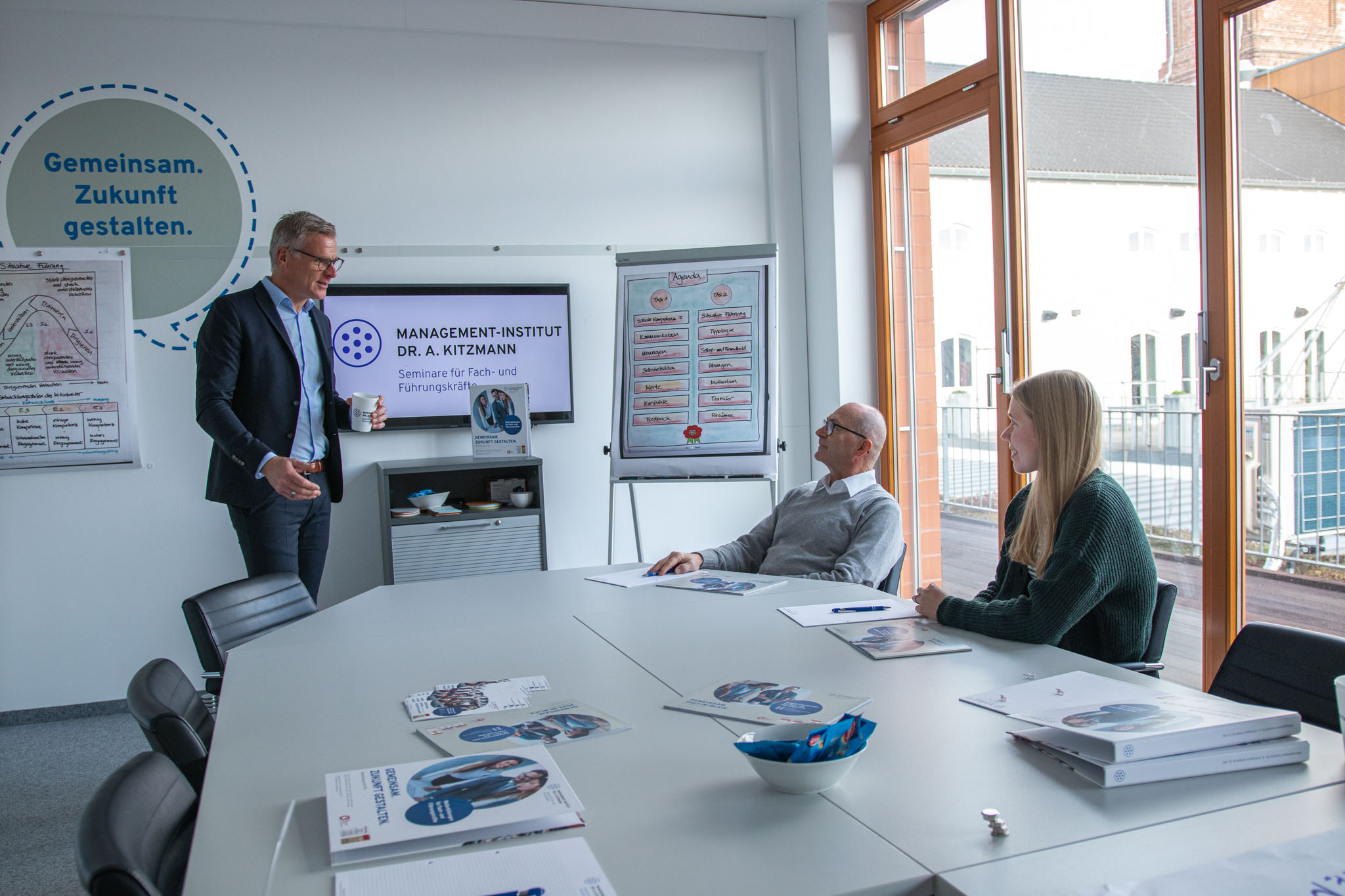
Conducting employee appraisals: a guide with a checklist
Employee appraisals are an important tool for promoting communication between employees and managers and for evaluating performance. Our guide uses examples and practical tips to show you how to successfully organize your performance reviews step by step.
What is an performance review?
An appraisal interview is a formal discussion between an employee and their line manager. It usually takes place in private or with the involvement of a staff representative. Among other things, it serves to promote the employee's development, provide feedback and clarify any problems or challenges in the workplace.
The subject of an appraisal interview can vary, but usually involves one of these topics:
- Performance appraisal: You assess the employee's performance and compare this with expectations and any target agreements.
- Target agreements: Long-term or short-term goals are linked to the employee's performance. These can be linked to a monetary incentive.
- Further training: You check whether the employee has the necessary skills for current or future tasks or whether there is still a need for training and further training.
- Career opportunities: You discuss your employee's promotion opportunities and the requirements that must be met for a promotion.
What types of employee appraisals are there?
Employee appraisals can take place at regular intervals and therefore be planned, or they can be of an ad hoc nature.
Regular performance reviews serve to achieve the company's long-term goals and the employee's personal development. They are a good opportunity to provide feedback on the employee's performance and to ensure that the employee feels comfortable in the company.
Examples of organized performance reviews:
Interview after the probationary period: in this interview, the employee finds out whether he or she has successfully completed the probationary period. Their performance to date is assessed and development opportunities are discussed.
Annual appraisal: Many companies plan annual or semi-annual appraisal interviews, which serve to give employees in-depth feedback on their performance and skills and to check how comfortable they feel in the company.
Weekly One-on-One: The One-on-One is becoming increasingly popular in German companies. The manager takes time each week to inquire about the well-being and status of projects and tasks. The aim is to solve potential problems quickly and effectively and to strengthen communication between the parties. According to a study by Gallup, regular (weekly) feedback contributes significantly to employee motivation.
Guidelines for employee appraisals: how to proceed
This guide will help you to plan and structure your appraisal interviews correctly. A successful performance review is based on a thorough preparation phase, a pre-scripted discussion process and conscientious follow-up.
Preparation
The success of the appraisal interview depends on good preparation. In addition to organizational points, it is also important to plan the content of the meeting. Start planning early and give employees enough time to prepare for the meeting. H3: Organizational preparation
Scheduling and time planning: Set a fixed date for the meeting. Plan this well in advance and make sure that it is firmly noted in the calendar. Choose a date that suits both parties and does not fall in a particularly stressful period. Allow sufficient time. This will signal to your conversation partner that the meeting is important to you. If you have to cancel at short notice, you should reschedule the meeting in good time.
Premises: It should be clear in advance where the meeting will take place. Choose a neutral room where you can speak undisturbed. If the call takes place virtually, you should also ensure a quiet environment and a stable internet connection. Of course, the camera should be switched on. Bear in mind that the conversation may last longer than planned.
Content preparation
Preparing the content of an appraisal interview is of central importance. It should be clear in advance what the topics and objectives of the meeting are - on both sides. The discussion points differ depending on the occasion. It is important to be clear about your own goals and the employee's needs. Put yourself in the other person's shoes and communicate empathetically and at eye level.
Topics
Think carefully about what you want to address in the appraisal interview and what you need to be able to steer the conversation effectively. Get feedback from colleagues. Make notes on good performance or performance that could be improved. Pick out individual examples that illustrate what has been said. Communicate the subject of the discussion to the employee in good time.
Possible topics for the discussion:
- Expectations of the employee
- The employee's performance and potential
- Development goals and further training opportunities
- Feedback from the employee to the manager/company
- Employee well-being (work-life balance, team dynamics, working environment)
Important: Every employee is different and reacts differently to criticism and praise. Some employees may not have the confidence to give negative feedback or question their own performance. Bear this in mind when preparing for the interview and formulating the questions.
Tools:
Use tools such as questionnaires to encourage the flow of conversation. For example, would you like feedback from your employee? Then create a questionnaire with precise questions, which you can have completed in advance and discuss during the meeting. Would you like to know how comfortable the employee feels in the company? Here too, mood barometers and specific questions, for example on team dynamics, can facilitate the dialog. Keep a record of what was discussed so that you can refer to it later.
Important: Give the employee enough time to complete questionnaires and prepare detailed feedback.
Protocols and target agreements:
Are there already minutes and target agreements from past meetings? Then go through these before the next meeting and make notes on possible points for discussion. Has what was discussed been implemented or is there still a need for action?
The process: The 4 phases of the performance review
A typical appraisal interview can be divided into 4 phases. Ensure a structured process in order to focus the conversation on the key topics.
Greeting and introduction
The introduction sets the scene for the entire conversation and is crucial for a conducive atmosphere.
Greet the employee in a friendly manner, explain that the conversation is confidential and that what is said will not have any negative consequences for the collaboration. The employee should feel comfortable and understand that an open discussion benefits both parties.
Then explain the process and the aim of the conversation.
Conversation and discussion
The main part of the conversation is based on the topics that you as a manager and the employee have prepared. Use questionnaires and feedback to give the conversation a structure, but give yourself and the employee the opportunity to ask questions, explain the statements and back them up with examples and clarify misunderstandings.
A good starting point is to ask about the employee's well-being. This can be followed by feedback on expectations and performance as well as feedback from the employee to the manager. Finally, the employee's development within the company and target agreements can be discussed.
Record goals and measures
The aim of the discussion is always to improve cooperation and increase the employee's motivation and well-being within the company. All measures required to achieve this should be recorded. Set clear goals for the implementation of further training measures; discuss how you can support the employee in concrete terms, e.g. through a clarifying discussion in the event of tensions in the team. This is the only way to create trust that you really care about improving the situation.
If certain things cannot be clarified immediately, make another appointment to look for a solution. However, make it clear to your discussion partner openly and transparently where the limits of what is feasible lie and do not promise anything that you cannot keep.
Follow-Up
A good appraisal interview needs to be followed up. This is the only way to ensure that what has been said is not forgotten after the meeting. After the meeting, create a written summary that includes both the points discussed and the next steps. This documentation serves as a basis for follow-up meetings.
In the documentation, also set clear deadlines for the implementation of the agreed objectives and measures and, if necessary, arrange a follow-up meeting within a realistic timeframe to check the progress of the measures and to give feedback.

Checklist for managers: How to make the appraisal interview a success
Preparation:
- Set a date
- Select a room
- Determine topics & inform employees about them
- Prepare tools & ask employees to fill out questionnaires or similar
- Check existing protocols
Interview procedure:
Introduction:
- Welcome
- Explain the confidentiality of the meeting
- Clarify the purpose of the meeting
Interview and discussion:
- Work through defined topics (e.g. questionnaire)
- Communicate your own views
- Listen to the employee's point of view
- Respond to questions, requests and criticism from the employee
- Record objectives and measures as well as deadlines and responsibilities
Follow-up:
- Summarize the meeting in writing and send a copy to the employee
- Set regular check-ins to review the progress of the measures